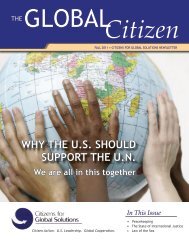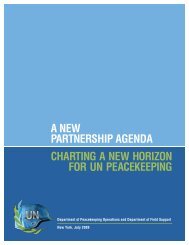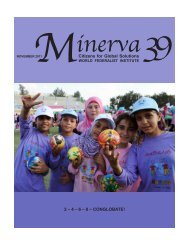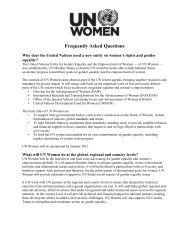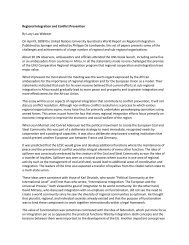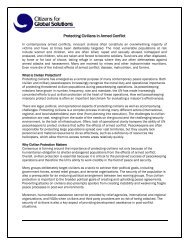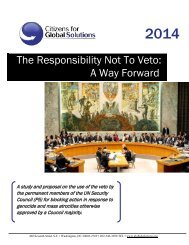Minerva, Spring 2008 (Volume 32) - Citizens for Global Solutions
Minerva, Spring 2008 (Volume 32) - Citizens for Global Solutions
Minerva, Spring 2008 (Volume 32) - Citizens for Global Solutions
Create successful ePaper yourself
Turn your PDF publications into a flip-book with our unique Google optimized e-Paper software.
wealth, environmental sustainability, respect<br />
<strong>for</strong> cultural diversity and representative<br />
and responsive governance;<br />
• Rebalancing the relationship between<br />
state and market, particularly increasing<br />
the ability and authority of governments<br />
to protect vulnerable citizens against market-induced<br />
insecurity;<br />
• Influencing the G8 and other OECD<br />
countries to honour existing aid commitments,<br />
and scaling up those that incorporate<br />
a focus on broad-based employment<br />
that takes into account the specific priorities<br />
and needs of women;<br />
• Scaling up aid <strong>for</strong> low-income, lowgrowth,<br />
post-conflict countries; and<br />
• Promoting equitable trade policies<br />
through stronger pressure on WTO members<br />
to overcome the current mercantilist<br />
approach to trade negotiations, and<br />
ensuring the needs of the poorest states<br />
are met and their vulnerable populations<br />
protected.<br />
THE IMPORTANCE<br />
OF WOMEN’S LEADERSHIP<br />
Women leaders can play an important role<br />
in reorienting development policies to address<br />
root causes of economic insecurity.<br />
While strong leadership is needed by both<br />
women and men, if women leaders take<br />
on this challenge individually and collectively<br />
it is more likely to catalyze fresh<br />
and focused approaches that are sustained<br />
over time. In the last decade women leaders<br />
have regularly championed the experiences<br />
of women and men whose livelihoods<br />
are buffeted by <strong>for</strong>ces beyond their<br />
control.<br />
Women leaders can take a cue from political<br />
leaders who have led in such a way in<br />
their own countries, like President Ellen<br />
Johnson Sirleaf of Liberia who has taken<br />
bold action domestically and with international<br />
actors to help her country recover<br />
from decades of strife and chronic poverty.<br />
They can demonstrate the kind of leadership<br />
shown by Nobel Laureate Wangari<br />
Maathai whose Green Belt Movement in<br />
Kenya 16 has shown how women can work<br />
in the face of government opposition to<br />
improve their own condition and address<br />
threats to the natural environment.<br />
There is much to learn from direct action<br />
by and <strong>for</strong> women in South Asia. 17 Perhaps<br />
the best-known example there is SEWA, 18<br />
the Self-Employed Women’s Association,<br />
which has worked since 1972 to support<br />
the invisible self-employed women<br />
workers who depend <strong>for</strong> their survival on<br />
their own labour (e.g. as manual labourers,<br />
porters and vendors). Founded under<br />
the leadership of Ela Bhatt, SEWA grew<br />
and championed work, income, food and<br />
social security <strong>for</strong> members and self-reliance<br />
in decision-making and economics.<br />
SEWA has worked in partnership with the<br />
WHO, the Indian government and various<br />
NGOs and spawned similar initiatives in<br />
Yemen, Turkey, and elsewhere.<br />
Latin America also has many success stories<br />
of direct grassroots action by women<br />
to address their economic insecurity. 19<br />
There are interesting examples of senior<br />
leaders nurturing women as change<br />
agents, e.g., in Brazil, both to ensure their<br />
representation in politics and to increase<br />
their influence as advocates <strong>for</strong> justice<br />
and equality. 20<br />
A powerful example of women based in<br />
the <strong>Global</strong> North engineering change <strong>for</strong><br />
women everywhere is the Women’s Environment<br />
and Development Organisation<br />
(WEDO), 21 founded in advance of the<br />
UN’s 1992 Conference on Environment<br />
and Development by Bella Abzug, which<br />
has organised women’s contributions to<br />
international policymaking, the Women’s<br />
Caucus at the UN, and facilitates the coming<br />
together of women from around the<br />
world to take action.<br />
CONCLUSION<br />
This Summit provides a unique opportunity<br />
<strong>for</strong> inspirational women leaders to<br />
initiate work on a renewed vision of global<br />
security. Promoting economic security<br />
is an important aspect of this. The vision<br />
will be instrumental in catalyzing leaders<br />
of developed countries to adopt policies<br />
that bring balanced benefits to women and<br />
men no matter where they live. And it will<br />
be important to influence the public not<br />
only in developed countries but also the<br />
opinion shapers and decision-makers in<br />
countries like China and Brazil, convincing<br />
them that the well-being of all rests<br />
41 • <strong>Minerva</strong> #<strong>32</strong> • June <strong>2008</strong><br />
on concern <strong>for</strong> all. Women could be at the<br />
<strong>for</strong>efront of a groundswell of public support<br />
<strong>for</strong> a vision like the one articulated by<br />
UNDP in 2003: quality economic growth,<br />
supportive of human development, is that<br />
which is job creating, poverty reducing,<br />
participatory, culturally enshrined and<br />
environmentally friendly. 22 This would be<br />
a significant contribution to addressing<br />
economic insecurity.<br />
We are witnessing a growth in the numbers<br />
of women working at the highest levels<br />
across all sectors, complemented by a<br />
vast community of women organising at<br />
the grassroots level in support of change.<br />
Their experiences have raised awareness<br />
of barriers to change and lessons are being<br />
learned about how to counter resistance<br />
and <strong>for</strong>m strategic alliances and supportive<br />
networks. At the political level, there<br />
is growing recognition of the importance<br />
of nurturing women change agents to ensure<br />
female representation and advocacy<br />
<strong>for</strong> justice and equality. 23<br />
Many leaders at this Summit are already<br />
experts in engineering coalitions <strong>for</strong><br />
change across political, social and business<br />
spheres. Many have been involved<br />
in pressing <strong>for</strong> change in the policies of<br />
multilateral organisations on areas such<br />
as gender, development, environment,<br />
security or rights. Others have built coalitions<br />
within their own states in difficult<br />
circumstances and have enjoyed policy<br />
successes (e.g. domestic violence laws in<br />
Brazil and family courts in Egypt). 24<br />
At the global level, champions are needed<br />
to provide and sustain direction at the<br />
highest institutional levels. Many women-led<br />
regional groupings already exist<br />
and can be built upon. These leaders will<br />
be important in working publicly and behind<br />
the scenes. Such champions need to<br />
rely on a supportive infrastructure – other<br />
stakeholders who share their vision and<br />
act as change agents at different organisational<br />
levels, raising awareness, following<br />
through, rein<strong>for</strong>cing messages and<br />
becoming involved on specifics in their<br />
respective domains.<br />
This agenda is more than a lifetime’s<br />
work. It is time <strong>for</strong> women, as leaders, to<br />
take the next step together.



